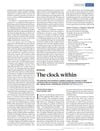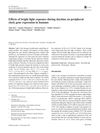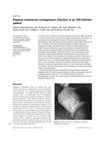6 citations,
March 2022 in “International journal of molecular sciences” Natural skincare products may help reduce sun damage and support the skin's daily cycle.
 91 citations,
August 2014 in “Development”
91 citations,
August 2014 in “Development” The circadian clock is crucial for tissue renewal and regeneration, affecting stem cell functions and having implications for health and disease.
 January 2025 in “Journal of Cutaneous and Aesthetic Surgery”
January 2025 in “Journal of Cutaneous and Aesthetic Surgery” Low-level laser therapy effectively improves hair growth in androgenetic alopecia with minimal side effects.
 January 2024 in “Diabetes & metabolism journal”
January 2024 in “Diabetes & metabolism journal” Disrupting natural body clocks increases the risk of developing type 2 diabetes.
August 2024 in “Journal of Clinical Medicine” Low-level laser therapy is the most supported treatment for hair loss, but other methods show promise.
 62 citations,
August 2014 in “BMC Endocrine Disorders”
62 citations,
August 2014 in “BMC Endocrine Disorders” New findings explain how genetic changes, body clocks, and certain molecules affect tissue response to stress hormones.
 38 citations,
August 2012 in “Biochemical and biophysical research communications”
38 citations,
August 2012 in “Biochemical and biophysical research communications” Human leukocytes and beard hair follicle cells have internal daily clocks, and PER1 and PER3 genes may indicate individual circadian rhythms.
 6 citations,
December 2011 in “Nature”
6 citations,
December 2011 in “Nature” The circadian clock in skin cells controls their growth and rest cycles.
 75 citations,
September 2017 in “Developmental biology”
75 citations,
September 2017 in “Developmental biology” The circadian clock influences the behavior and regeneration of stem cells in the body.
 5 citations,
December 2016 in “International journal of biometeorology”
5 citations,
December 2016 in “International journal of biometeorology” Bright light during the day doesn't change most human clock genes but may slightly increase Rev-erb-ß.
 84 citations,
December 2017 in “EMBO Reports”
84 citations,
December 2017 in “EMBO Reports” Circadian rhythms are crucial for stem cell function and tissue repair, and understanding them may improve aging and regeneration treatments.
 293 citations,
November 2011 in “Nature”
293 citations,
November 2011 in “Nature” The circadian clock affects skin stem cell behavior, impacting aging and cancer risk.
 116 citations,
May 2013 in “Proceedings of the National Academy of Sciences of the United States of America”
116 citations,
May 2013 in “Proceedings of the National Academy of Sciences of the United States of America” Hair grows faster in the morning and is more vulnerable to damage from radiation due to the internal clock in hair follicle cells.
 12 citations,
July 2017 in “Scientific reports”
12 citations,
July 2017 in “Scientific reports” Researchers developed a way to study human body clocks using hair tissue, which works similarly in both healthy and dementia patients.
103 citations,
December 2021 in “Journal of biological rhythms” Shift work disrupts the body's natural clock, leading to health problems.
23 citations,
July 2021 in “Life” Blue light can help treat skin conditions like eczema and acne without major side effects.
 11 citations,
May 1998 in “International Journal of Dermatology”
11 citations,
May 1998 in “International Journal of Dermatology” Using a blow dryer in a certain way can cause localized hair damage with bubble formation inside the hair.
 14 citations,
June 2016 in “Hypertension research”
14 citations,
June 2016 in “Hypertension research” New method uses hair follicle cells to estimate human body clock phase, potentially improving sleep disorder diagnosis.

The trial aims to understand how obesity and lifestyle affect circadian rhythms in people with schizophrenia and bipolar disorder.














